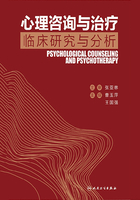
参考文献
1.Freud S. Dora: An Analysis of a Case of Hysteria Study. http: //www.gradesaver.com/dora-an-analysis-of-a-caseof-hysteria [Date of access: Apr 8, 2014].
2.Rogers C, Lyon HC, Tausch R. On Becoming an Effective Teacher-Person-centered Teaching//Rogers C, Lyon HC. Psychology, Philosophy, and Dialogues. London: Routledge, 2013: 95-113.
3.Chase S. Narrative inquiry: Multiple lenses, approaches, voices//Denzin NK, Lincoln YS. The SAGE handbook of qualitative research.3rd ed. Thousand Oaks, London: Sage, 2005: 651-679.
4.Bernard J. The Unknown Karen Horney: Essays on Gender, Culture, and Psychoanalysis. New Haven: Yale University Press, 2000: 96-107.
5.Louise F, Karina WD, Daniel B. Evidence searching for evidence-based psychology practice. Prof Psychol Res Pr, 2010, 41(8):550-557.
6.APA Presidential Task Force on Evidence-Based Practice. Evidence-Based Practice in Psychology. American Psychologist, 2005, 61(4):271-285.
7.Walkup JT, Albano AM, Piacentini J, et al. Cognitive-behavior therapy, sertraline, or a combination for childhood anxiety. New England Journal of Medicine, 2008, 359: 2753-66.
8.Norman KD, Yvonna SL. Handbook of qualitative research.4th ed. Thousand Oaks: Sage, 2011: 37-84.
9.Cohen D. Clinical psychopharmacology trials: “Gold standard” or fool′s gold. In SA Kirk. Mental disorders in the social environment: Critical perspectives. New York: Columbia University Press, 2005: 347-367.
10.Barlow DH. Health care policy, psychotherapy research, and the future of psychotherapy. American Psychologist, 1996, 51(10):1050-1058.
11.Seligman MEP. The effectiveness of psychotherapy: The consumer reports study. American Psychologist, 1995, 50(12):965-974.
12.Fonagy P. Psychotherapy research: Do we know what works for whom? The British Journal of Psychiatry, 2010, 197(2):83-85.
13.Hill CE, Corbett MM. A perspective on the history of process and outcome research in counseling psychology. Journal of Counseling Psychology, 1993, 40(1):3-24.
14.Eysenck HJ. The effects of psychotherapy: An evaluation. Journal of Consulting Psychology, 1952, 16(5):319-324.
15.Joyce AS, Wolfaardt U, Sribney C, et al. Psychotherapy research at the start of the 21st century: The persistence of the art versus science controversy. Canadian Journal of Psychiatry, 2006, 51(13):797-809.
16.Joyce AS, Piper WE. Expectancy, the therapeutic alliance, and treatment outcome in short-term individual psychotherapy. Journal of Psychotherapy Practice and Research, 1998, 7(3):236-248.
17.Omer H, London P. Signal and noise in psychotherapy. The role and control of non-specific factors. The British Journal of Psychiatry, 1989, 155(2):239-245.
18.Kendall PC, Holmbek G, Verdun T. Methodology, design, and evaluation in psychotherapy research//Lambert MJ. Handbook of psychotherapy and behaviour change. New York: John Wiley&Sons, Inc., 2004: 16-43.
19.Schulz H, Harfst T, Andreas S, et al. Can quality of life in psychotherapy be measured with clinician-ratings? A comparison of patient-and clinician-ratings using the SF-8. Rehabilitation(Stuttg), 2009, 48(5):270-276.
20.Smith ML, Glass GV, Miller TI. The benefits of psychotherapy. Baltimore: Johns Hopkins University Press, 1980: 25-36.
21.Slade K, Lambert MJ, Harmon SC, et al. Improving psychotherapy outcome: The use of immediate electronic feedback and revised clinical support tools. Clinical Psychology and Psychotherapy, 2008, 15(5):287-303.
22.Pyne JM, Labbate C. Ranking of outcome domains for use in real-time outcomes feedback laboratory by patients with schizophrenia. The Journal of Nervous and Mental Disease, 2008, 196(4):336-339.
23.Knaup C, Koesters M, Schoefer D, et al. Effect of feedback of treatment outcome in specialist mental healthcare: Meta-analysis. The British Journal of Psychiatry, 2009, 195(1):15-22.
24.Moncher FJ, Prinz RJ. Treatment fidelity in outcome studies. Clinical Psychology Review, 1991, 11(3):247-266.
25.Perepletchikova F, Treat TA, Kazdin AE. Treatment integrity in psychotherapy research: Analysis of the studies and examination of the associated factors. Journal of Consulting and Clinical Psychology, 2007, 75(6):829-841.
26.Perepletchikova F, Hilt LM, Chereji E, et al. Barriers to implementing treatment integrity procedures: survey of treatment outcome researchers. Journal of Consulting and Clinical Psychology, 2009, 77(2):212-218.
27.Mergenthaler E, Stinson C. Psychotherapy transcription standards. Psychother Res, 1992, 2(2):125-142.
28.Kiesler DJ, Strupp H. The process of psychotherapy: Empirical foundations and systems of analysis. Aldine De Gruyter, 2006: 186-213.
29.Gottman JM, Roy AK. Sequential analysis: A guide for behavioral researchers. Cambridge: Cambridge University Press, 1990: 1531.
30.Davis MS. Variations in patients’ compliance with doctors’ advice: An empirical analysis of patterns o communication. American Journal of Public Health, 1968, 58(2):274-288.
31.Gordon SE, Gill RT. Cognitive task analysis//Zsambok CA, Klein G. Naturalistic Decision Making. Mahwah, N. J.: Erbaum, 1997: 131-140.
32.Wicks A, Whiteford G. Conceptual and practical issues in qualitative research: Reflections on a life-history study. Scandinavian Journal of Occupational Therapy, 2006, 13(2):94-100.
33.Miles MB, Huberman AM. Qualitative data analysis. New York: Sage Publications, 1999: 11-13.
34.Orlinsky D, Ronnestad M, Willutzki U. Fifty years of psychotherapy process-outcome research: Continuity and change. Bergin and Garfield’s Handbook of Psychotherapy and Behavior Change, 2004, 5: 307-390.
35.Horvath AO, Symonds BD. Relation between working alliance and outcome in psychotherapy: A meta-analysis. Journal of Counseling Psychology, 1991, 38(2):139-149.
36.Stiles WB. Psychotherapy process-outcome correlations may be misleading. Psychotherapy: Theory, Research, Practice, Training, 1988, 25(1):27-35.
37.Stiles WB, Honos-Webb L, Surko M. Responsiveness in psychotherapy. Clinical Psychology: Science and Practice, 1998, 5(4):439-458.
38.Arthur JC. Empathy in counseling and psychotherapy: perspectives and Practices. Routledge, 2007: 78-86.
39.Chistensen LB, Johnson RB, Turner LA. Research Methods, Design, and Analysis.(Eleventh Edition). Boston: Pearson Education, Inc., publishing as Allyn&Bacon, 2011.
40.艾小青,曹玉萍,张亚林.心理治疗的临床研究方法.中国临床心理学杂志,2012,20(1):125-128.
41.艾小青,曹玉萍,张亚林.心理治疗的内容分析.中国心理卫生杂志,2012,26(5):373-376.
42.曾洁.动力性心理治疗过程的质性个案研究.长沙:中南大学博士学位论文,2014.
43.钱铭怡.心理咨询与心理治疗.北京:北京大学出版社,1994:34-71.
44.江光荣.心理咨询与治疗.合肥:安徽人民出版社,2001:152-176.
45.Coyle LE.心理学质性资料的分析.毕重增, 主译.重庆: 重庆大学出版社, 2010.